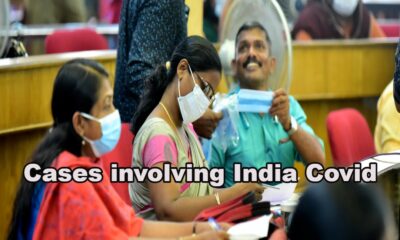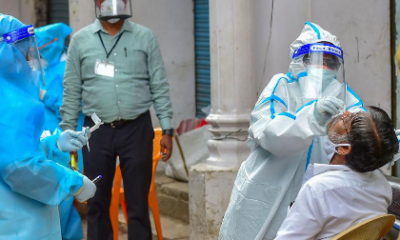Covid 19
Global acceptance of Covid vaccines has increased: study
Published
1 year agoon

The study highlights the wide variation between countries and the importance of tailored communication strategies in addressing vaccine hesitancy.
Acceptance of COVID in Washington According to a survey of 23 countries representing more than 60% of the world’s population, global vaccination rates increased from 75.2% in 2021 to 79.1% in 2022.
The study highlights the wide variation between countries and the importance of tailored communication strategies in addressing vaccine hesitancy. The Barcelona Institute for Global Health (ISGlobal) in Spain and the City University of New York Graduate School of Public Health and Health Policy (CUNY SPH) in the United States led the initiative.
According to the study, vaccine acceptance has decreased in eight countries, and nearly one in every eight vaccinated respondents, particularly younger men and women, are hesitant to receive a booster dose. The findings were published in the journal Nature Medicine.
Read Also – Ram Charan Posts Photo Of “RRR Family” On The Red Carpet At The Golden Globes
“The pandemic is far from over, and authorities must address vaccine hesitancy and resistance as part of their COVID-19 prevention and mitigation strategy,” says Jeffrey V. Lazarus, Head of ISGlobal’s Health Systems Research Group.
To do so effectively, policymakers, according to the study, need solid data on vaccine hesitancy trends (whether they are decreasing or increasing and in which populations) and drivers (factors that influence vaccine acceptance, such as income or education).
An international collaboration led by Lazarus and Ayman El-Mohandes, Dean of CUNY SPH, conducted a series of surveys beginning in 2020 across 23 densely populated countries hard hit by the pandemic. According to the study, the data presented here correspond to the third survey, which was conducted between June and July 2022.
Brazil, Canada, China, Ecuador, France, Germany, Ghana, India, Italy, Kenya, Mexico, Nigeria, Peru, Poland, Russia, Singapore, South Africa, South Korea, Spain, Sweden, Turkey, the United Kingdom, and the United States were among the countries polled, according to the study.
79.1 percent of the 23,000 respondents surveyed, 1000 per country, were willing to accept vaccination. According to the study, this result represented a 5.2% increase from June 2021.
Parent’s willingness to vaccinate their children increased slightly, from 67.6 percent in 2021 to 69.5 percent in 2022. According to the study, eight countries experienced increased hesitancy, ranging from 1.0 percent in the United Kingdom to 21.1 percent in South Africa.
Almost one-eighth of vaccinated respondents, 12.1%, were unsure about booster doses. According to the study, younger age groups (18-29 years) were more hesitant.
“We must remain vigilant in tracking these data, containing COVID-19 variants, and addressing hesitancy, which may pose a challenge to future routine COVID-19 immunization programs,” said senior author Ayman El-Mohandes.
In addition, the survey provides new information on COVID-19 treatments received. According to the study, ivermectin was taken with the same frequency as other approved medications around the world, despite the fact that the WHO and other agencies do not recommend its use to prevent or treat COVID-19.
You may like
-


India Records 2,151 Cases Of Covid In The Past 24 Hours, Most In Five Months
-


After COVID, is there a higher heart rate and more palpitations? What medical professionals recommend is listed below
-


According to a study, the majority of chronic Covid symptoms go away one year following a moderate infection
-


INDIA REPORTED 175 NEW COVID-19 CASES IN THE PAST DAY, BRINGING THE TOTAL NUMBER OF ACTIVE CASES DOWN TO 2,570
-


After meeting Mandaviya on Covid, doctors said, “Allow a second booster dose”
-


Concerns over China’s covid rise should India have?
